Corrected right atrium - Study guides, Class notes & Summaries
Looking for the best study guides, study notes and summaries about Corrected right atrium? On this page you'll find 207 study documents about Corrected right atrium.
Page 3 out of 207 results
Sort by
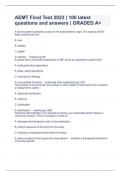
-
AEMT Final Test 2023 | 100 latest questions and answers | GRADED A+
- Exam (elaborations) • 23 pages • 2023
- Available in package deal
-
- $10.99
- + learn more
AEMT Final Test 2023 | 100 latest questions and answers | GRADED A+ A trauma patient complains of pain to the costovertebral angle. The organ(s) MOST likely injured is/are the: A. liver B. bladder C. spleen D. kidneys - kidneys pg.291 A patient with a core body temperature of 85F would be expected to present with: A. profoundly slow respirations B. deep, rapid respirations C. confusion or lethargy D. uncontrolled shivering - profoundly slow respirations pg.1378 T...
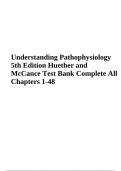
-
Understanding Pathophysiology 5th Edition Huether and McCance Test Bank Complete Chapters 1-48 (2023-2024)
- Exam (elaborations) • 652 pages • 2023
-
Available in package deal
-
- $36.49
- + learn more
Alterations of Cardiovascular Function in Children Test Bank MULTIPLE CHOICE 1. An 8-week-old infant presents to his pediatrician for a well-baby checkup. Physical exam reveals a murmur and an echocardiogram confirms a ventricular septal defect. Which of the following genetic factors should the nurse assess for as it would most likely accompany this diagnosis? ANS: C Down syndrome is the genetic factor that would most likely accompany the diagnosis of a congenital heart defect. a. Hunt...
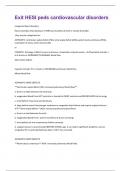
-
Exit HESI peds cardiovascular disorders question with complete solution graded A+
- Exam (elaborations) • 9 pages • 2023
-
- $4.49
- + learn more
Congenital heart disorders Heart anomalies that develop in UTERO and manifest at birth or shortly thereafter -they may be categorized as: ACYANOTIC: ventricular septal defect (VSD), atrial septal defect (ASD), patent ductus arteriosus (PDA), coarctation of aorta, aortic stenosis (AS) or CYANOTIC: tetrology of fallot, truncus arteriosus, tranposition of great vessels - Acyantotic include: L to R shunts or INCREASED PULMONARY blood flow Obstructive defects Cyanotic include: R to L shunts ...
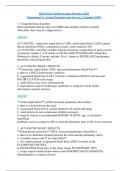
-
HESI Peds Cardiovascular Disorders 2023 Guaranteed A+ Actual Questions and Answers, Complete 100%
- Exam (elaborations) • 9 pages • 2023
- Available in package deal
-
- $11.99
- + learn more
HESI Peds Cardiovascular Disorders 2023 Guaranteed A+ Actual Questions and Answers, Complete 100% 1. Congenital heart disorders Heart anomalies that develop in UTERO and manifest at birth or shortly Thereafter -they may be categorized as: Answer: ACYANOTIC: ventricular septal defect (VSD), atrial septal defect (ASD), patent ductus arteriosus (PDA), coarctation of aorta, aortic stenosis (AS) or CYANOTIC: tetrology of fallot, truncus arteriosus, tranposition of great vessels: Acyantotic ...
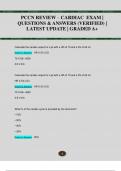
-
PCCN REVIEW – CARDIAC EXAM | QUESTIONS & ANSWERS (VERIFIED) | LATEST UPDATE | GRADED A+
- Exam (elaborations) • 137 pages • 2024
- Available in package deal
-
- $21.49
- + learn more
1 PCCN REVIEW – CARDIAC EXAM | QUESTIONS & ANSWERS (VERIFIED) | LATEST UPDATE | GRADED A+ Calculate the cardiac output for a pt with a HR of 70 and a SV of 65 ml. Correct Answer: HR X SV=CO 70 X 65= 4550 4.6 L/min Calculate the cardiac output for a pt with a HR of 70 and a SV of 65 ml. HR X SV=CO Correct Answer: HR X SV=CO 70 X 65= 4550 4.6 L/min What % of the cardiac cycle is provided by the atrial kick? • 15% • 20% • 30% • 35% Correct Answer: 20% 2 Atrial kick i...
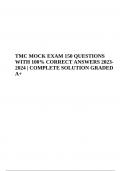
-
TMC EXAM PRACTICE QUESTIONS WITH 100% CORRECT ANSWERS COMPLETE SOLUTION (GRADED A+ 2023- 2024)
- Exam (elaborations) • 64 pages • 2023
-
- $24.49
- + learn more
TMC EXAM PRACTICE QUESTIONS WITH 100% CORRECT ANSWERS COMPLETE SOLUTION (GRADED A+ 2023- 2024) A COPD patient receiving volume-controlled A/C ventilation at a rate of 15 and a VT of 650 mL exhibits signs of air trapping (auto-PEEP). Which of the following alternatives would you recommend to help overcome this problem? 1. add an end-inspiratory pause 2. switch to SIMV and decrease the rate 3. increase the inspiratory flow 2 and 3 only 1, 2, and 3 1 and 3 only 1 and 2 only. Ans- 2 and 3 ...
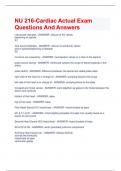
-
NU 216-Cardiac Actual Exam Questions And Answers
- Exam (elaborations) • 5 pages • 2023
- Available in package deal
-
- $11.49
- + learn more
NU 216-Cardiac Actual Exam Questions And Answers Lub sound indicates - ANSWER- closure of AV valves beginning of systole S1 Dub sound indicates - ANSWER- closure of semilunar valves end of systole/beginning of diastole S2 murmurs are caused by - ANSWER- incompetent valves or a hole in the septum pulse occurs during - ANSWER- ventricular systole the surge of blood expands in the artery pulse deficit - ANSWER- difference between the apical and radial pulse rates right side of the hea...
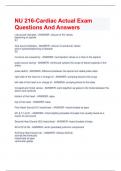
-
NU 216-Cardiac Actual Exam Questions And Answers
- Exam (elaborations) • 5 pages • 2023
-
Available in package deal
-
- $9.49
- + learn more
NU 216-Cardiac Actual Exam Questions And Answers Lub sound indicates - ANSWER- closure of AV valves beginning of systole S1 Dub sound indicates - ANSWER- closure of semilunar valves end of systole/beginning of diastole S2 murmurs are caused by - ANSWER- incompetent valves or a hole in the septum pulse occurs during - ANSWER- ventricular systole the surge of blood expands in the artery pulse deficit - ANSWER- difference between the apical and radial pulse rates right side of...

-
HEALTH SCIENCE HS101 UPDATED VERSION 2023 GRADED A +
- Exam (elaborations) • 11 pages • 2023
-
- $16.99
- + learn more
HEALTH SCIENCE HS101 UPDATED VERSION 2023 GRADED A + 1. A nurse is caring for a patient with a diagnosis of deep venous thrombosis (DVT). The patient has an order to receive 30 mg enoxaparin (Lovenox). Which injection site should the nurse use to administer this medication safely? A. Buttock, upper outer quadrant B. Abdomen, anteriorlateral aspect Correct C. Back of the arm, 2 inches away from a mole D. Anterolateral thigh, with no scar tissue nearby Enoxaparin (Lovenox...
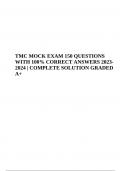
-
TMC MOCK EXAM QUESTIONS WITH 100% VERIFIED ANSWERS 2023- 2024 | LATEST GRADED A+
- Exam (elaborations) • 64 pages • 2023
-
- $23.49
- + learn more
A physician has attempted on several occasions to insert a central venous catheter into the right subclavian vein of a patient receiving mechanical ventilation. Suddenly the ventilator's high-pressure alarm sounds, the patient's blood pressure drops, and the SPO2 value drips from 96% to 84%. Breath sounds are greatly diminished over the right-lung field. What action should you recommend? -insert a chest tube into the right pleural space -insert a pulmonary artery catheter -pull the ET b...

Did you know that on average a seller on Stuvia earns $82 per month selling study resources? Hmm, hint, hint. Discover all about earning on Stuvia


